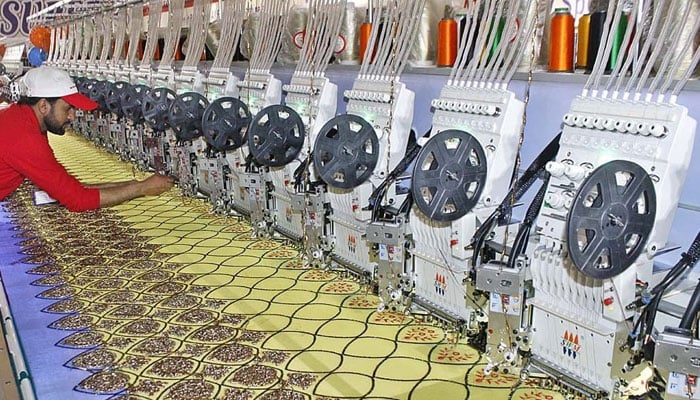Upcoming 2024-25 budget: Hosiery manufacturers want budget focus on boosting exports
Rs40 billion under the textile policy for duty drawback taxes, technology upgradation funds and markup support remain unpaid
FAISALABAD: Patron-in-Chief of the Pakistan Hosiery Manufacturers and Exporters Association Chaudhry Salamat Ali has emphasized the need for the upcoming 2024-25 budget to focus on boosting exports to help the country overcome its economic crisis.
He stressed the importance of reinstating the “zero-rating” regime for the export industry to alleviate the financial difficulties of exporters and ensure they do not face a shortage of working capital. He highlighted that a total of Rs145 billion in sales tax, Rs25 billion in duty drawbacks, and Rs40 billion in income tax and income tax credits have been outstanding for several years.
Additionally, Rs40 billion under the textile policy for duty drawback taxes, technology upgradation funds and markup support remain unpaid. He called for at least Rs250 billion to be allocated in the new budget to address these payments.
Salamat Ali also pointed out the need to operationalize the “Faster” system, designed under Rule 39F of the Sales Tax Act 2006, to ensure sales tax refunds are paid within 72 hours, thereby eliminating unnecessary delays.
He suggested that the budget should provide a clear roadmap for the payment of income tax, income tax credit and customs rebate refunds to exporters. He advocated for the continuation of the final tax regime to maintain the benefits provided to exporters. Furthermore, he urged commercial banks to introduce new and improved financing schemes for exporters to resolve the issue of capital shortages faced by textile exporters. He also highlighted the need to rationalize energy tariffs based on the actual cost of services, ensuring that the burden of subsidies provided to other sectors does not fall on textile exporters.
-
 Prince Harry Let Slip Real Feelings Amid 'incredibly Personal' Speech
Prince Harry Let Slip Real Feelings Amid 'incredibly Personal' Speech -
 Sarah Michelle Gellar Shares Unexpected Key To Marriage With Freddie Prinze Jr.
Sarah Michelle Gellar Shares Unexpected Key To Marriage With Freddie Prinze Jr. -
 Los Angeles Firefighter Held After Woman Found Dead In Home
Los Angeles Firefighter Held After Woman Found Dead In Home -
 Yerin Ha Reflects On 'transformative' Experience Of Starring In 'Bridgerton 4'
Yerin Ha Reflects On 'transformative' Experience Of Starring In 'Bridgerton 4' -
 Travis Scott Shares Biggest Lesson Of Fatherhood
Travis Scott Shares Biggest Lesson Of Fatherhood -
 How Are 2026 Oscar Nominations Chosen?
How Are 2026 Oscar Nominations Chosen? -
 Oscars 2026: 'Sinners' Makes History With Record 16 Nominations
Oscars 2026: 'Sinners' Makes History With Record 16 Nominations -
 Chris Pratt Nearly Entered Hollywood Under A Very Different Name
Chris Pratt Nearly Entered Hollywood Under A Very Different Name -
 Nicki Minaj Determined To Not Walk 'anything Back' As She Zeros In On 'real Power'
Nicki Minaj Determined To Not Walk 'anything Back' As She Zeros In On 'real Power' -
 Taylor Swift Named To Songwriters Hall Of Fame
Taylor Swift Named To Songwriters Hall Of Fame -
 Ellen DeGeneres Sparks Backlash With Minneapolis Videos
Ellen DeGeneres Sparks Backlash With Minneapolis Videos -
 ‘90 Day Fiancé’ Star Accused Of Stealing Thousands From Former Employer
‘90 Day Fiancé’ Star Accused Of Stealing Thousands From Former Employer -
 Prince William Visits Isambard-AI Supercomputer Capable Of Doing 80 Years Of Human Work In One Second
Prince William Visits Isambard-AI Supercomputer Capable Of Doing 80 Years Of Human Work In One Second -
 Yerin Ha Recalls Chemistry Read With Luke Thompson Ahead Of 'Bridgerton' Season 4
Yerin Ha Recalls Chemistry Read With Luke Thompson Ahead Of 'Bridgerton' Season 4 -
 Prince Harry Coached Brooklyn Beckham Before Explosive On David, Victoria
Prince Harry Coached Brooklyn Beckham Before Explosive On David, Victoria -
 Princess Eugenie Deeply Disappointed In Andrew, Sarah Ferguson
Princess Eugenie Deeply Disappointed In Andrew, Sarah Ferguson




